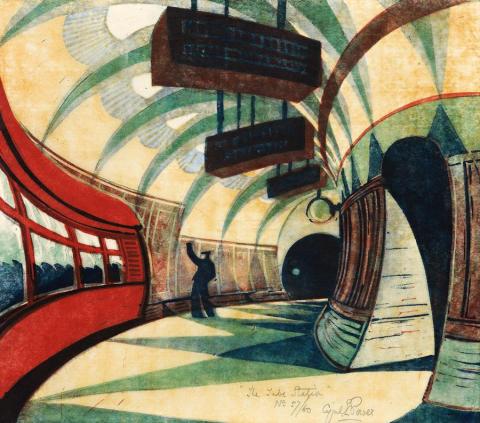THE TUBE STATION, c.1932
CYRIL POWER
colour linocut on oriental tissue
25.0 x 29.0 cm
signed, titled and numbered lower centre: “The Tube Station” / No 57/60 / Cyril. E. Power
Christie's, Melbourne, 23 November 1998, lot 153
Private collection, Melbourne
Modern Colour Prints, Redfern Gallery, London, 21 July – 20 August 1932, cat. 2 (another example)
Modern Colour Prints and Wood Engravings from the Redfern Gallery, Old Bond Street, London, Collins House, under the auspices of the Arts and Crafts Society of Victoria, Melbourne, 7 – 23 December 1932, cat. 28 (another example)
Rhythms of Modern Life: British Prints 1914–1939, Museum of Fine Arts, Boston, 30 January – 1 June 2008; Metropolitan Museum of Art, New York, 23 September – 14 December 2008; and Wolfsonian-Florida International University, Miami, 21 November 2009 – 28 February 2010, cat. 49 (another example)
‘Redfern Gallery', The Times, London, 23 July 1932, p. 8 Rutter, F., 'Modern Colour Prints. A Democratic Art', The Sunday Times, London, 7 August 1932, p. 5
Coppel, S., Linocuts of the Machine Age: Claude Flight and the Grosvenor School, Scolar Press, Aldershot, England, in association with the National Gallery of Australia, 1995, p. 98, cat. CEP 32 (illus. p. 99, another example)
Ackley, C.S. (ed.), British Prints from the Machine Age: Rhythms of Modern Life 1914–1939, Thames and Hudson, London, 2008, pp. 94, 215, cat. 49 (illus. front cover and p. 105, another example)
Another example of this print is held in the collection of the Metropolitan Museum of Art, New York
The following excerpts are from Rippner, S., 'Urban Life/Urban Dynamism', in Ackley, C.S. (ed.), British Prints from the Machine Age: Rhythms of Modern Life 1914-1939, Thames and Hudson, London, 2008, pp. 94-95
Cyril Power 'picked up on and exaggerated [C.R.W.] Nevinson's angular forms and expressive use of color to convey a sense of dynamism in his urban images of London. Rather than portray the city's historic buildings or bridges, he focused intentionally on its modern underground system in linocuts such as ... The Tube Station ... Both [Claude] Flight and Power, together with other members of the Grosvenor School, captured the dynamism of urban life with a simplified language of forms and color that serves as a foil to Nevinson's more naturalistic and detailed images in black and white. They were not alone in their interest in the city: the modern metropolis - whether New York or London - provided inspiration to many contemporary artists seeking an alternative to more traditional means of representation. The city's energy and vitality, combined with its new industries, architecture, and infrastructure, affected how the artists saw the world and their role within it. For Nevinson, Flight and Power, the overwhelming power of the modern city alternately dwarfed its inhabitants rendered them obsolete, or transformed them into faceless or caricatured beings. Their varied styles and compositions reflect both the awe and the anxiety felt by many urban dwellers and visitors at the time.'
